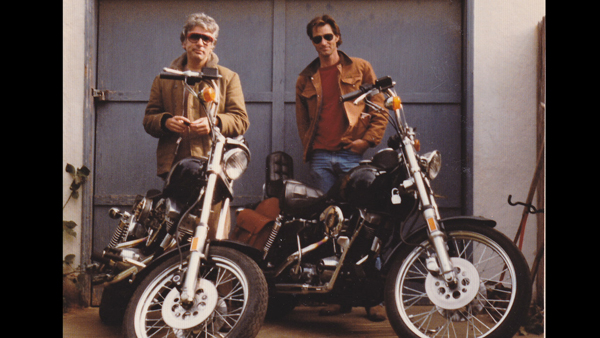![]() Pulitzer Prize-winning playwright and Academy Award nominated actor Sam Shepard accepts a proposal to publish decades-worth of correspondence between himself and best friend Johnny Dark. He looks at the opportunity as a new creative venture. He recently has left his longtime partner, Jessica Lange, and keenly aware of his age (66), he actively explores what has and has not changed about himself over the years, remarking, “Time brings a certain yearning towards past experience.” He arranges to get Johnny’s half of the correspondence, along with numerous photos and home movies that his friend has meticulously archived, and to work with Johnny on getting it all organized. Treva Wurmfeld’s absorbing documentary begins as they embark on this shared endeavor.
Pulitzer Prize-winning playwright and Academy Award nominated actor Sam Shepard accepts a proposal to publish decades-worth of correspondence between himself and best friend Johnny Dark. He looks at the opportunity as a new creative venture. He recently has left his longtime partner, Jessica Lange, and keenly aware of his age (66), he actively explores what has and has not changed about himself over the years, remarking, “Time brings a certain yearning towards past experience.” He arranges to get Johnny’s half of the correspondence, along with numerous photos and home movies that his friend has meticulously archived, and to work with Johnny on getting it all organized. Treva Wurmfeld’s absorbing documentary begins as they embark on this shared endeavor.
In contrast to Sam, who seems to be constantly on the road, Johnny is a homebody, seemingly content with his daily routine. Johnny comments on how different the two of them are, but he figures that their 46-year friendship has lasted due to the ways that they complement each other’s personality. Onscreen they start out laughing together over the shared memories, but, as they delve into more painful aspects of their past, each man begins to retreat further and further into himself. Their relationship appears to be crumbling, old resentments are given voice, and the future of their shared project seems in jeopardy.
The genius of Wurmfeld’s documentary is that despite all of the passages from old letters, the stories, photos/videos that she has so skillfully woven into the film, it is the present day circumstance of these two men that holds the most power. What they share at this stage in their lives, their struggle to come to terms with the past, and each man’s fundamental solitude would all seem to drive them apart, yet at the same time fuels their continued need to correspond.
This is a portrait of an enduring friendship that is best characterized by a condition that would seem to negate its very existence. In Sam’s summation, “Aloneness becomes an essential thing in your life. Everything you face in terms of relationships, death, has to do with your aloneness, and you have to keep returning to it.”
Despite the depth of its exploration into each man’s way of thinking, Wurmfeld has managed to keep this an engaging film full of humor and loving moments, artfully filmed and edited, and featuring some well- chosen tracks by Bob Dylan. Filmed over an 18 month-period in New Mexico, Texas, California, and Kentucky, it has won numerous well-deserved accolades at festivals.







Leave A Comment